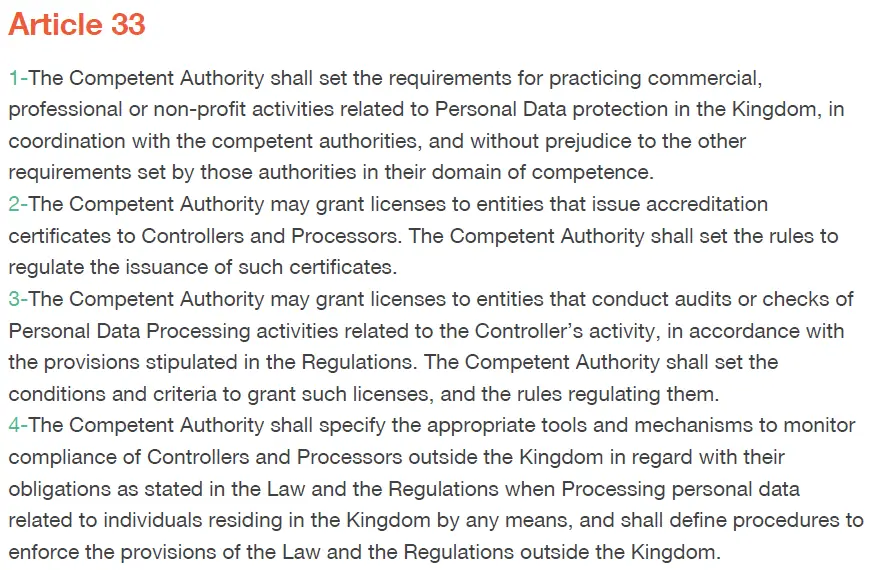
Abstract
This article provides a detailed examination of Article 33 of the Kingdom of Saudi Arabia’s Personal Data Protection Law (PDPL), emphasizing the role of regulatory oversight, licensing provisions for entities issuing accreditation certificates, auditing requirements, and cross-border compliance. By establishing rules to govern the issuance of licenses and certificates, the Competent Authority seeks to ensure that Controllers and Processors, whether within or outside the Kingdom, uphold the highest standards of personal data protection.
Keywords
Personal Data Protection; Licensing; Compliance; Accreditation; Audit; Saudi Arabia; PDPL
Introduction KSA PDPL – Article 33
Article 33 of the Saudi Arabian PDPL introduces comprehensive requirements for the protection of personal data, with particular attention to compliance for organizations involved in commercial, professional, or non-profit activities. This article sets forth the mechanisms for regulatory enforcement, emphasizing the importance of licensing and certification for organizations processing personal data within and beyond Saudi borders. Through this framework, the Competent Authority aims to fortify data privacy standards, mandating compliance measures and establishing oversight procedures.
Explanation
- The Competent Authority coordinates with relevant bodies to establish guidelines for personal data protection.
- Licensing provisions enable certain entities to issue accreditation certificates to Controllers and Processors.
- The Competent Authority may issue licenses for entities conducting audits on data processing activities.
- Mechanisms are specified for monitoring compliance, particularly for Controllers and Processors outside the Kingdom.
Key Strategic Points KSA PDPL – Article 33
- Article 33 emphasizes the following strategic points:
- Establishment of licensing requirements for data protection activities.
- Oversight of accreditation processes for Controllers and Processors.
- Monitoring and auditing practices to ensure compliance.
- Enforcing cross-border data protection obligations for entities outside the Kingdom.
General Activation Steps
- Assess current data protection measures against Article 33 requirements.
- Identify qualified entities for licensing and accreditation.
- Develop cross-border data protection strategies.
- Regularly review compliance processes with accredited third-party auditors.
Enablement Methodology KSA PDPL – Article 33
Organizations can achieve compliance by implementing systematic data protection processes, engaging with certified auditors, and leveraging licensed tools to maintain adherence to Article 33 requirements.
Use Cases
- A healthcare provider obtains a data protection certificate to verify patient privacy compliance.
- An international retailer hires an accredited auditor to ensure GDPR and PDPL adherence.
Dependencies
Dependencies include a skilled workforce, certified audit entities, and tools for real-time compliance monitoring.
Tools/Technologies
Examples include privacy compliance software, data monitoring tools, audit platforms, and secure data processing systems.
Challenges & Risks In KSA PDPL – Article 33
Challenges include limited access to certified auditors, technological costs, cross-border enforcement complexities, and adapting to evolving regulations.
Conclusion
Article 33 of the KSA PDPL plays a critical role in enforcing personal data protection across commercial, non-profit, and professional sectors. Through licensing and certification mechanisms, the Competent Authority seeks to maintain high compliance standards within and beyond the Kingdom’s borders, ensuring robust protection for individuals’ data. Organizations are encouraged to prioritize compliance with these regulations to enhance data privacy and avoid potential penalties.
Recommended Resources
- Big Data vs. Traditional Data, Data Warehousing, AI, and Beyond
- Big Data Security, Privacy, and Protection, & Addressing the Challenges of Big Data
- Designing Big Data Infrastructure and Modeling
- Leveraging Big Data through NoSQL Databases
- Data Strategy vs. Data Platform Strategy
- ABAC – Attribute-Based Access Control
- Consequences of Personal Data Breaches
- KSA PDPL (Personal Data Protection Law) – Initial Framework
- KSA PDPL – Consent Not Mandatory
- KSA PDPL Article 4, 5, 6, 7, 8, 9, 10, 11, & 12
- KSA PDPL Article 13, 14, 15, 16, 17, 18, 19, 20, 21, 22, 23, 24, 25, 26, 27, 28, 29, 30, & 31
- KSA NDMO – Data Catalog and Metadata
- KSA NDMO – Personal Data Protection – Initial Assessment
- KSA NDMO – DG Artifacts Control – Data Management Issue Tracking Register
- KSA NDMO – Personal Data Protection – PDP Plan, & PDP Training, Data Breach Notification
- KSA NDMO – Classification Process, Data Breach Management, & Data Subject Rights
- KSA NDMO – Privacy Notice and Consent Management
- Enterprise Architecture Governance & TOGAF – Components
- Enterprise Architecture & Architecture Framework
- TOGAF – ADM (Architecture Development Method) vs. Enterprise Continuum
- TOGAF – Architecture Content Framework
- TOGAF – ADM Features & Phases
- Data Security Standards
- Data Steward – Stewardship Activities
- Data Modeling – Metrics and Checklist
- How to Measure the Value of Data
- What is Content and Content Management?

